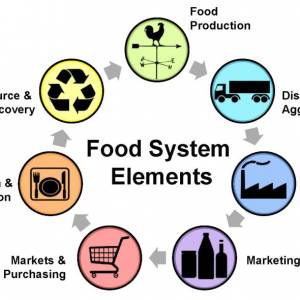
WHY Hunger and the US Food Sovereignty Alliance kick off the Food Week of Action with a pre-event, a ceremony for the Food Sovereignty Prize winner and three honorees!
You can watch the event, which took place on October 10 in NYC, in its entirety on the Food Sovereignty Prize site.
As an alternative to the World Food Prize, the Food Sovereignty Prize champions solutions coming from those most impacted by the injustices of the global food system. Celebrate community-led efforts to win food sovereignty for all.
Highlights of the ceremony include presentations from:
- International and National Honorees, including prize winner the Korean Women’s Peasant Association (a Grassroots’ partner through the Via Campesina), as well as honorees: the Unified Peasant Movement of Aguan Region, National Fisheries Solidarity Movement, and the Coalition of Immokalee Workers (Grassroots’ allies).
- Special guests Tom Morello (of the Nightwatchman and Rage Against the Machine); Olivier de Schutter (UN Special Rapporteur on the Right to Food); and Karen Washington (longtime food justice activist)
Read about the amazing events happening in India in the following and see the new paper from Ecumenical Advocacy Alliance – “Nourishing the World: Scaling Up Agroecology,” which takes on the myth that only industrial agriculture can feed the world by looking at the successes of smaller-scale sustainable farming approaches and their potential!
World Food Day 2012
ACTIVITIES & EVENTS
From Presbyterian Hunger Program’s Joining Hands Program, US Food Sovereignty Alliance, and Other Events Related to World Food Day
Go to the US Food Sovereignty Alliance Food Week of Action page
or
Download a PDF of the Activities to read, print or share via email
Below are the actions we are asking people to do this fall, both during the Food Week of Action (oct. 14-21), on World Food Day (Oct. 16) or anytime throughout the fall.
ACT for JUSTICE in the FOOD CHAIN . . .
1. With Farmworkers! Stand in solidarity with farm workers and the Coalition of Immokalee Workers and send a supermarket postcard or manager’s letter
2. With Family Farmers! Push for transparency in the Trans-Pacific Partnership to make sure family farmers and people who eat are not hurt by this secretly negotiated international trade agreement.
3. With Food Workers! Become an ally of employees behind the kitchen door. Request a raise to the tipped minimum wage of $2.13 an hour for restaurant workers.
4. With Hungry People and God’s Creation! We’re burning our crops as fuel rather than using land to grow food. Tell the Obama Administration to waive the mandate for corn ethanol.
* You can find a new World Food Day prayer from the Presbyterian Hunger Program used today during our closing devotions at our Advisory Committee meeting.
Food sovereignty, the real World Food prize
…”The Green Revolution fully ignored the role of democratic policy — which avoids ecological and social costs while ensuring that food production and food producers remain vital to their society and culture.
From the perspective of family farmers and peasants who revere “food sovereignty,” sustainable, democratic foods that respect ecology, culture and diversity of economic opportunity offer a lot more than just improving the “quality, quantity or availability of food” for current and future generations. …”
READ the full article from press-citizen.com

Press Release
Christian alliance calls for investment in agroecology to end hunger and build resilient communities
The Presbyterian Church USA partners with the Ecumenical Advocacy Alliance (EAA), which just released a paper calling for increased investment in sustainable agricultural practices that support small-scale farmers and local communities, and also benefit the environment.
“Nourishing the World: Scaling up Agroecology” presents numerous examples of the successful use of agroecological methods in increasing yields for farmers using locally-available natural resources while lowering or eliminating farmers’ reliance on costly and polluting chemical fertilizers and pesticides.
Global figures on hunger released today by the United Nations Food and Agriculture Organization, the International Fund for Agricultural Development and the World Food Programme emphasize the urgency of investing in effective policies and practices to feed the world. Nearly 870 million people, or 1 in 8, were suffering chronic undernourishment in 2010-2012. According to the report, global progress in reducing hunger has levelled off since 2007-2008, with the number of hungry people rising in Africa and developed regions. More than 1 in 4 people in Africa are chronically hungry.
“Tackling hunger is not in the first instance about producing more food,” says Christine Campeau, EAA’s Food Campaign Coordinator. “It is about investing responsibly in sustainable agricultural practices and changing wasteful consumer habits that will benefit people, communities and the environment now and in the long-term.”
The paper sets out an alternative path to the one currently being promoted by some governmental and private sector initiatives, which is to expand the industrial “green revolution” style of agriculture. While this type of agriculture has certainly increased food production in recent decades, it has also “destabilized the natural resource base and drives much of the loss of biodiversity” as well as contributing – directly and indirectly – to the 30% of total global greenhouse gas emissions (GHG) currently generated by the agricultural sector.
“In developed countries, where industrial-scale monocropping is the prevailing agricultural model, it is easy to forget that the majority of the world’s food is produced by smallholder farmers,” states Peter Prove, EAA Executive Director. “The answer to hunger and food insecurity is not turning more of these small farms into huge plantations, which damage both local communities and the environment, but investing in the knowledge-sharing, networking and sustainable practices that have proven to increase yields, protect the natural environment, empower communities, and enhance resilience in the face of a changing climate.”
“It’s all about Christian stewardship of God’s creation, and responding to the needs of people and communities rather than corporations”, stressed Nigussu Legesse, Programme Executive for Africa of World Council of Churches and member of the EAA’s Food Strategy Group.
The paper has been released in advanced of the meeting of the Committee on World Food Security (CFS) in Rome, 15-20 October. Civil society representatives who participate in the CFS as part of a Civil Society Mechanism are calling on CFS members to act immediately to help small-scale food producers to adapt to climate change and prevent further dangerous climate change-related impacts on food security. In this context, the EAA is calling for:
* Much greater investment in research on agroecological food production methods, building on traditional knowledge and existing best practice, for the purpose of enhancing smallholder-based, low-emission, high-productivity agriculture in the context of climate change.
* Increased support for the establishment and expansion of farmer-to-farmer networks at local levels throughout the developing world, for the sharing of information and best practices in agroecological food production.
* Enabling policy environments at national and international levels, recognizing the central role of smallholder farmers in global food security and supporting smallholder-based agroecological food production, and agroecological extension programs at national and local levels.
* Increased support for the establishment and expansion of smallholder farmers’ collectives, to improve market opportunities and the collective capacities of smallholder farmers and their communities.
* More effective regulation and management of the negative impacts of corporate influence of agricultural policy and practice.
* More focused and effective attention to reducing food waste throughout the food supply chain.
“Agroecology will be necessary, if we are to find a viable path through the intertwined challenges of future food security, and climate change mitigation and adaptation,” the paper states in its conclusion. “In the context of climate change, business as usual in the field of food production is not an option. Agroecology offers the prospect of sustainable food production to meet the needs of a still growing global population, while at the same time reducing the GHG emissions from the agricultural sector, building resilience to already unavoidable climate change, protecting biodiversity, and sustaining communities and rural livelihoods.”
Nourishing the World: Scaling Up Agorecology is available at: http://tinyurl.com/EAAagroecology2012
Read more »
 Join these Virtual Food Week Activities: Breaking the Imperialist Food Chains: Online Forum on the Global Food Crisis October 10, 2022, 9:00 a.m. (EDT) An online forum is organized to expose how the continued and intensified neoliberal offensive is taking place in our food systems amid the global food crisis; critique the recent efforts of… Read more »
Join these Virtual Food Week Activities: Breaking the Imperialist Food Chains: Online Forum on the Global Food Crisis October 10, 2022, 9:00 a.m. (EDT) An online forum is organized to expose how the continued and intensified neoliberal offensive is taking place in our food systems amid the global food crisis; critique the recent efforts of… Read more »
 Join these Virtual Food Week Activities: Breaking the Imperialist Food Chains: Online Forum on the Global Food Crisis October 10, 2022, 9:00 a.m. (EDT) An online forum is organized to expose how the continued and intensified neoliberal offensive is taking place in our food systems amid the global food crisis; critique the recent efforts of… Read more »
Join these Virtual Food Week Activities: Breaking the Imperialist Food Chains: Online Forum on the Global Food Crisis October 10, 2022, 9:00 a.m. (EDT) An online forum is organized to expose how the continued and intensified neoliberal offensive is taking place in our food systems amid the global food crisis; critique the recent efforts of… Read more »
 Understanding our food and how it gets to us is no simple task. This overview is a snapshot of the situation of workers and dynamics in our country’s food and farm system. The goal was to outline the current situation in the pandemic and possible solutions for each part of the food chain. It is…
Understanding our food and how it gets to us is no simple task. This overview is a snapshot of the situation of workers and dynamics in our country’s food and farm system. The goal was to outline the current situation in the pandemic and possible solutions for each part of the food chain. It is…  Dear Friends in Christ, Happy belated Easter. As we approach the summer, may we continue to practice resurrection! Since I last wrote you in mid-January, eleven churches have joined as Hunger Action Congregations. With the great support from Rev. Meg Overstreet in Giddings-Lovejoy Presbytery, Missouri has generated many new HACs! And we have our first…
Dear Friends in Christ, Happy belated Easter. As we approach the summer, may we continue to practice resurrection! Since I last wrote you in mid-January, eleven churches have joined as Hunger Action Congregations. With the great support from Rev. Meg Overstreet in Giddings-Lovejoy Presbytery, Missouri has generated many new HACs! And we have our first… 

